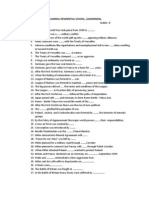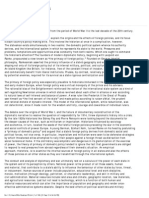Essay On Bismarck's Brilliant Diplomacy
Essay On Bismarck's Brilliant Diplomacy
Uploaded by
Lilika94Copyright:
Available Formats
Essay On Bismarck's Brilliant Diplomacy
Essay On Bismarck's Brilliant Diplomacy
Uploaded by
Lilika94Original Title
Copyright
Available Formats
Share this document
Did you find this document useful?
Is this content inappropriate?
Copyright:
Available Formats
Essay On Bismarck's Brilliant Diplomacy
Essay On Bismarck's Brilliant Diplomacy
Uploaded by
Lilika94Copyright:
Available Formats
Essay on Bismarck's Brilliant Diplomacy
Germany's invasion of France via Belgium was the initial act of war that brought about the commencement of war. However, is it fair to say that it was Germany and Germany alone who acted to bring about this first step? I would argue that a series of events led to the German invasion of Belgium, but to what extent could Germany be blamed for this series of events? Germany was a new power in Europe; the unification of Germany under Prussian leadership in January 1871 was the result of the brilliant diplomacy of Otto von Bismarck who by skilful use of war, and his excellent methods of convincing others of his good intentions created the new empire. However, the emergence of the German empire had upset the balance of Central Europe maintained for centuries by the Holy Roman Empire and temporarily sustained by the German Confederation. Many people believe that the invoking of hatred within France by the creation of this new empire and the mistrust of the other surrounding empires over Prussian expansionist tendencies led inevitably to a European war. The fact that war was averted for nearly forty years was due to Bismarck's brilliant diplomacy. He managed to convince the other European powers that Prussia's only ambition was to consolidate its gains and not to expand further. He also made a series of complex treaties with Russia, Austria and Italy. The basic outcome of this web of agreements was that Germany had a neutrality pact with Russia in the event of an Austro-Russian war, whilst promising support to Austria and Italy in the event of a war with another country. These treaties succeeded in isolating France a kept the peace for a considerable time, in this way what Bismarck achieved was momentous. Whether, had Bismarck continued as German Chancellor after 1890 on the accession of Wilhelm II, war may have been averted we will never know. It is unlikely that Bismarck's delay could have been sustained indefinitely even had Bismarck remained as Chancellor. However, war, if inevitable, would have come about in a different way under Bismarck as he would have never allowed the alliance system of 1914 exist had he been in power. Caprivi's legacy was not perhaps as rosy as his predecessor had intended. Despite France's still being isolated and treaties still existing between Germany and Russia, Italy and Austria, the situation was more complex. Problems had existed between Austria and Russia for many years over an area known as the Balkans. The Ottoman Empire was in a state of disintegration with both Austria and Russia vying for a greater influence in the area. Both powers held a right to do so as Russia, predominantly a Slav country, felt that they should have an influence with their fellow Slavs. However, Austria felt that if she did not have an influence in the area, Russia's policy would lead to a surge of Slav nationalist spirit with the inevitable
result that Austria's Slavic peoples would rise up and overthrow Habsburg rule. Austria was a declining power by this time and had regions of the empire begun to break away, it was likely that a Slav nationalist uprising would result in the overthrow of the system and an end to Habsburg rule. For these reasons, Russia and Austria clashed frequently over the issue of the Balkans and indeed it was from this area that the spark for the First World War would come. The most important of the Balkan crises came in 1878. In 1876-77, full-scale Bulgarian uprising led to a confrontation between Turkey (The Ottoman empire) and Russia that led to a war from 1877-1878 over the future of Bulgaria resulted in a defeat for the Turks. The Russians then forced the Turks to sign the Treaty of San Stefano. This treaty contained harsh terms that were felt by Britain and Austria-Hungary to give Russia too much power in the Balkans area. Bismarck, unwilling to upset either Austria or Russia decided to play the 'honest broker' in the conference of Berlin in 1878. The result was that Russia was unhappy about the settlement over Bulgaria, as it appeared to them that the Germans, represented by Bismarck had sided with Austria. Even Bismarck's diplomacy had floundered over the difficult and complex situation in the Balkans. The result was a distinct cooling of relations between Russia and Germany, resulting in the effectual invalidation of the Reinsurance Treaty between the two powers that insured the neutrality of Russia in the event of a war with France.
You might also like
- Blood and Iron: The Rise and Fall of the German EmpireFrom EverandBlood and Iron: The Rise and Fall of the German EmpireRating: 4 out of 5 stars4/5 (16)
- IB History Notes - The BalkansDocument5 pagesIB History Notes - The BalkansemilyNo ratings yet
- The Illustrated History of World War I: The Battles, Personalities, Events and Key Weapons From All Fronts In The First World War 1914-18From EverandThe Illustrated History of World War I: The Battles, Personalities, Events and Key Weapons From All Fronts In The First World War 1914-18Rating: 1 out of 5 stars1/5 (1)
- The Causes of WW1 - IB History HL NotesDocument9 pagesThe Causes of WW1 - IB History HL NotesCyberdiz100% (3)
- The Berlin WallDocument5 pagesThe Berlin WallMiguel Moreira100% (1)
- The First World WarDocument11 pagesThe First World WaraustinNo ratings yet
- Bismarck's Foreign Policy 1871Document5 pagesBismarck's Foreign Policy 1871jedisli0% (1)
- World War IDocument16 pagesWorld War IarvindranganathanNo ratings yet
- Chapter 3: Bismarckian Foreign Policy (1871-1890)Document5 pagesChapter 3: Bismarckian Foreign Policy (1871-1890)Nabajyoti Rudra PalNo ratings yet
- Chapter 18 AP EuroDocument10 pagesChapter 18 AP Eurokeniafuentes185380No ratings yet
- To What Extent Is Germany Responsible For The Outbreak of WW1Document4 pagesTo What Extent Is Germany Responsible For The Outbreak of WW1Isabelle OdenbachNo ratings yet
- The Great War - Causes: Home US History IB History Professional Soccer History ProjectsDocument4 pagesThe Great War - Causes: Home US History IB History Professional Soccer History ProjectsKateGalvanNo ratings yet
- Wells - Russia and The Franco-Prussian WarDocument6 pagesWells - Russia and The Franco-Prussian WarLorena PopescuNo ratings yet
- German Foreign Policy: International Relations 1871 - 1914Document20 pagesGerman Foreign Policy: International Relations 1871 - 1914Umar NaveedNo ratings yet
- Bismarck's Policies - Austria&France (1862-1871)Document1 pageBismarck's Policies - Austria&France (1862-1871)AlicjaNo ratings yet
- Europe Since 1890Document21 pagesEurope Since 1890adrianschixNo ratings yet
- Marching Toward WarDocument4 pagesMarching Toward WarjillysillyNo ratings yet
- Q&A Assassination Led To WWIDocument2 pagesQ&A Assassination Led To WWIsajjanmaheshkaNo ratings yet
- 2. Long Term Causes of WW1Document9 pages2. Long Term Causes of WW1jianweisong0615No ratings yet
- HISOTRY 2"the Wars of Unification Were The Most Significant Factor in The Establishment of The German Empire." To What Extent Do You Agree With This StatementDocument2 pagesHISOTRY 2"the Wars of Unification Were The Most Significant Factor in The Establishment of The German Empire." To What Extent Do You Agree With This Statementjoakim.lund420420No ratings yet
- Unifications of GermanyDocument6 pagesUnifications of Germanystreltsov.skeNo ratings yet
- U13 First World WarDocument47 pagesU13 First World WarAsmi ChaturvediNo ratings yet
- German UnificationDocument4 pagesGerman UnificationSusi MeierNo ratings yet
- Causes of World War IDocument39 pagesCauses of World War Iaugtibcalclanero@yahoo.comNo ratings yet
- Germany and BismarckDocument30 pagesGermany and Bismarckichelle.oghaleNo ratings yet
- WW1 Report ScriptDocument33 pagesWW1 Report ScriptCarl June NaraisoNo ratings yet
- SeropDocument5 pagesSeropfarkhan.muhamaddNo ratings yet
- Alliance SystemDocument18 pagesAlliance SystemShah JahanNo ratings yet
- CH 29 Sec 1 - Marching Towards War PDFDocument4 pagesCH 29 Sec 1 - Marching Towards War PDFMrEHsieh100% (2)
- Causes of WW1 - EssayDocument2 pagesCauses of WW1 - EssayaliceNo ratings yet
- Causes of World War IDocument10 pagesCauses of World War Ivernon whiteNo ratings yet
- European History ProjectDocument3 pagesEuropean History ProjectSofia DyerNo ratings yet
- Michael J. Seth A Concise History of ModernDocument18 pagesMichael J. Seth A Concise History of Modernshubham sharmaNo ratings yet
- History Essay FinalDocument2 pagesHistory Essay FinalAarav KapoorNo ratings yet
- Causes of World War OneDocument3 pagesCauses of World War Onemp94No ratings yet
- The Congress of BerlinDocument6 pagesThe Congress of BerlinFREIMUZICNo ratings yet
- Causes of World War IDocument33 pagesCauses of World War IDharani 12biomathsNo ratings yet
- Evaluate The 3 Major Causes of WW1Document3 pagesEvaluate The 3 Major Causes of WW1ghatzimanolis100% (1)
- The Unification of GermanyDocument3 pagesThe Unification of GermanyforexkumbiraiNo ratings yet
- German Unification AssignmentDocument5 pagesGerman Unification Assignmentmpal14201No ratings yet
- Britain Between WarsDocument6 pagesBritain Between WarsMai Lo Pilato BloisNo ratings yet
- Austro-Prussian War (1866) Prussia vs Austria, Bavaria, Saxony, and HanoverFrom EverandAustro-Prussian War (1866) Prussia vs Austria, Bavaria, Saxony, and HanoverNo ratings yet
- lecture05Document35 pageslecture05chenjy38No ratings yet
- Causes of The First World War (WW1)Document3 pagesCauses of The First World War (WW1)Koh Hui XinNo ratings yet
- Russian LeadershipDocument4 pagesRussian LeadershiplogisticsthreeteeNo ratings yet
- WW 1Document3 pagesWW 1Lucy MooreNo ratings yet
- WWI Test Study GuideDocument9 pagesWWI Test Study GuideChristian WongNo ratings yet
- chapter 10 module (1)Document23 pageschapter 10 module (1)Margareth De VillaNo ratings yet
- The Unification of GermanyDocument3 pagesThe Unification of GermanyAnissabrosaNo ratings yet
- World War 1Document28 pagesWorld War 1Cathy KatrinaNo ratings yet
- Origins of World War 1Document8 pagesOrigins of World War 1api-362318985No ratings yet
- Origins of The Great WarDocument11 pagesOrigins of The Great Warvernon whiteNo ratings yet
- Unit 12. The First World WarDocument9 pagesUnit 12. The First World Warcanavatesoledad4No ratings yet
- Unification of Germany 1871Document5 pagesUnification of Germany 1871nayeem4338No ratings yet
- German Unification Revision GridDocument2 pagesGerman Unification Revision GridRyan Zamora100% (2)
- Bismarck's Foreign Policy NotesDocument3 pagesBismarck's Foreign Policy NotesJack Usher100% (1)
- 2 World War I Marching Toward WarDocument21 pages2 World War I Marching Toward WarDaryna ZykinaNo ratings yet
- Zorica Becanovic-NikolicDocument16 pagesZorica Becanovic-NikolicLilika94No ratings yet
- Sale, Greater Manchester: From Wikipedia, The Free EncyclopediaDocument15 pagesSale, Greater Manchester: From Wikipedia, The Free EncyclopediaLilika94No ratings yet
- Marche SlaveDocument2 pagesMarche SlaveLilika94No ratings yet
- Petrarka - 360. Kancona (Eng.)Document4 pagesPetrarka - 360. Kancona (Eng.)Lilika94No ratings yet
- Filmovi Za GledanjeDocument1 pageFilmovi Za GledanjeLilika94No ratings yet
- Bogdan Popovic - O Poslednjim Stihovima Pesme Banovic StrahinjaDocument8 pagesBogdan Popovic - O Poslednjim Stihovima Pesme Banovic StrahinjaLilika94100% (1)
- About Gabriel MachtDocument5 pagesAbout Gabriel MachtLilika94No ratings yet
- Present Simple - VezbeDocument2 pagesPresent Simple - VezbeLilika94No ratings yet
- Baby Im YoursDocument1 pageBaby Im YoursLilika94No ratings yet
- Olga ConstantinovaDocument14 pagesOlga ConstantinovaLilika94No ratings yet
- Tenses (Vremena)Document8 pagesTenses (Vremena)Lilika94No ratings yet
- Tuesday's GoneDocument3 pagesTuesday's GoneLilika94No ratings yet
- Losing My ReligionDocument1 pageLosing My ReligionLilika94No ratings yet
- India's Approach Towards Israel-Palestine in Recent YearsDocument5 pagesIndia's Approach Towards Israel-Palestine in Recent YearsShashank Shekhar SinghNo ratings yet
- Impact of European Settlement: Cammeraygal Bennelong Barangaroo Geoffrey BlaineyDocument2 pagesImpact of European Settlement: Cammeraygal Bennelong Barangaroo Geoffrey BlaineymosesNo ratings yet
- Fill in The Blanks For X in SocialDocument2 pagesFill in The Blanks For X in SocialMunnar KeralaNo ratings yet
- Who's Chasing Whom? Vietnam-US Relations and Theories of Alignment and AllianceDocument49 pagesWho's Chasing Whom? Vietnam-US Relations and Theories of Alignment and AllianceThanh Dat TranNo ratings yet
- Borbala Obrusanszky - Ghengis Khaan, Reformer of The Ancient Steppe Symbols of PowerDocument6 pagesBorbala Obrusanszky - Ghengis Khaan, Reformer of The Ancient Steppe Symbols of PowerJános SallaiNo ratings yet
- Europe and China's New Silk RoadsDocument78 pagesEurope and China's New Silk Roadsasawer19No ratings yet
- STANISŁAW ŻERKO: Poland, Germany and The Genesis of World War IIDocument26 pagesSTANISŁAW ŻERKO: Poland, Germany and The Genesis of World War IIInstytut Zachodni w PoznaniuNo ratings yet
- Silk Power and Diplomacy in ByzantiumDocument12 pagesSilk Power and Diplomacy in ByzantiumLiz AbyNo ratings yet
- Treaty of Versailles DBQDocument7 pagesTreaty of Versailles DBQapi-305324419No ratings yet
- The EQ TimelineDocument2 pagesThe EQ TimelineJeff100% (1)
- Appeasement WorksheetDocument3 pagesAppeasement Worksheetsarah50% (2)
- Pakistan-Iran Relations in The Evolving International EnvironmentDocument19 pagesPakistan-Iran Relations in The Evolving International EnvironmentAfzaal AhmadNo ratings yet
- IB History Paper One Revision For May 2012Document48 pagesIB History Paper One Revision For May 2012alvinli83008283No ratings yet
- Sahana PradhanDocument5 pagesSahana Pradhanbhimacharya2002No ratings yet
- Pakistan Foreign PolicyDocument14 pagesPakistan Foreign PolicyZafar100% (3)
- AN ANALYSIS OF ATATüRK'S FOREIGN POLICYDocument55 pagesAN ANALYSIS OF ATATüRK'S FOREIGN POLICYer2ruleNo ratings yet
- Che ChinaDocument2 pagesChe ChinaelderblogNo ratings yet
- Revision For Units 1 2 and 3 AnswersDocument5 pagesRevision For Units 1 2 and 3 Answerszied0% (1)
- Amir TimurDocument4 pagesAmir TimurSapa KurbanklichevNo ratings yet
- International RelationsDocument199 pagesInternational RelationsWaqar YusufNo ratings yet
- Accomplices Not Allies PrintDocument6 pagesAccomplices Not Allies PrintConfused CrackerNo ratings yet
- Dont Judge Me DudeDocument6 pagesDont Judge Me DudeAhmad RaifahNo ratings yet
- World War 1Document12 pagesWorld War 1sunem blackNo ratings yet
- EVE Online PVP Ranking H2 2015Document17 pagesEVE Online PVP Ranking H2 2015Dan100% (2)
- Fifty Years of African UnityDocument1 pageFifty Years of African UnityCityPressNo ratings yet
- Preston. El Mito de Hendaya.Document17 pagesPreston. El Mito de Hendaya.kopdezNo ratings yet
- China Strategic Partnership DiplomacyDocument20 pagesChina Strategic Partnership DiplomacyIgnacio PuntinNo ratings yet
- ACT EAST POLICY & ASEAN by Soumyabrata DharDocument6 pagesACT EAST POLICY & ASEAN by Soumyabrata DharSoumyabrata DharNo ratings yet
- Preview of "Timeline of U.S.-Thai Relations - Embassy of The United States Bangkok, Thailand"Document8 pagesPreview of "Timeline of U.S.-Thai Relations - Embassy of The United States Bangkok, Thailand"Louise Lisominutse'No ratings yet






































































































